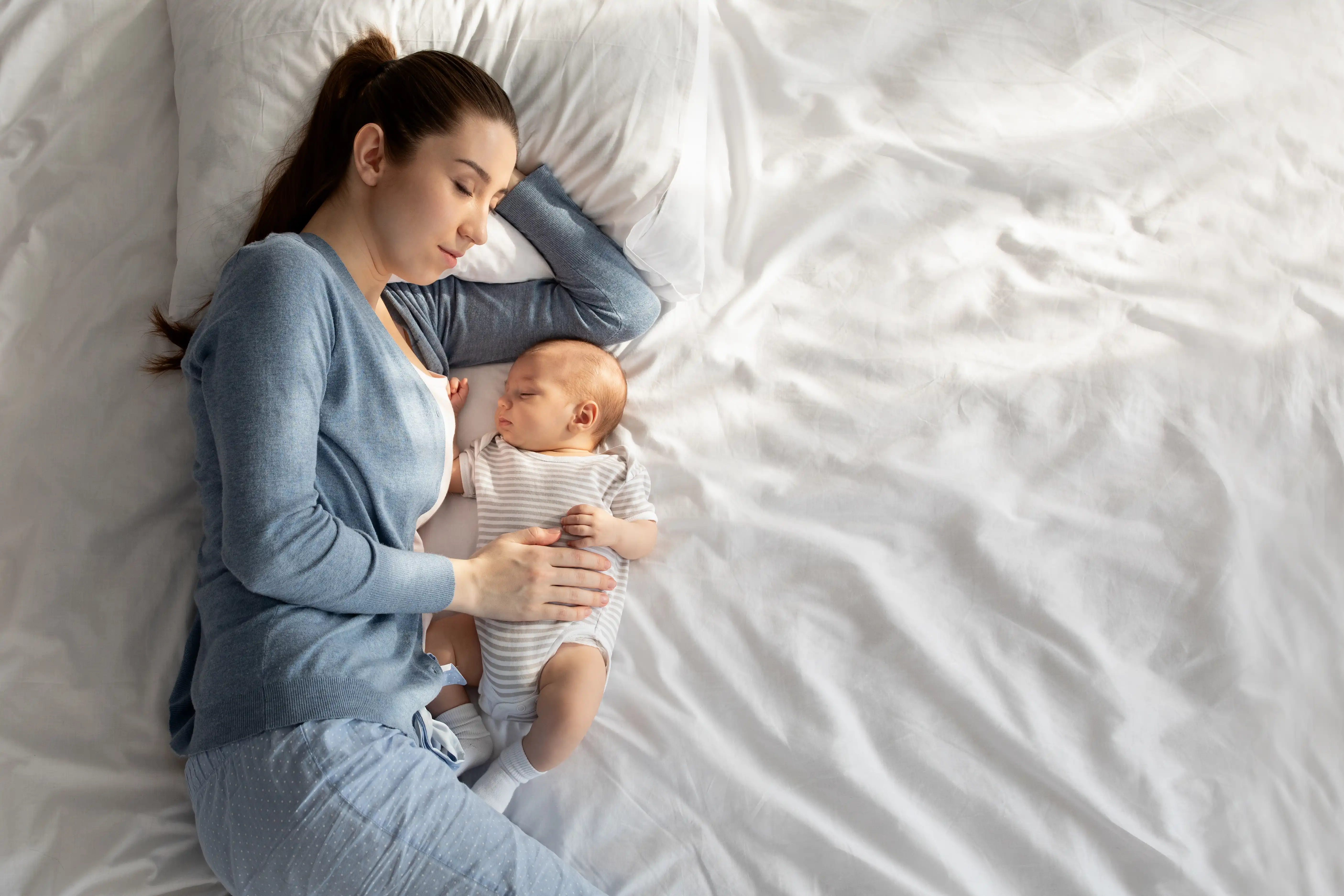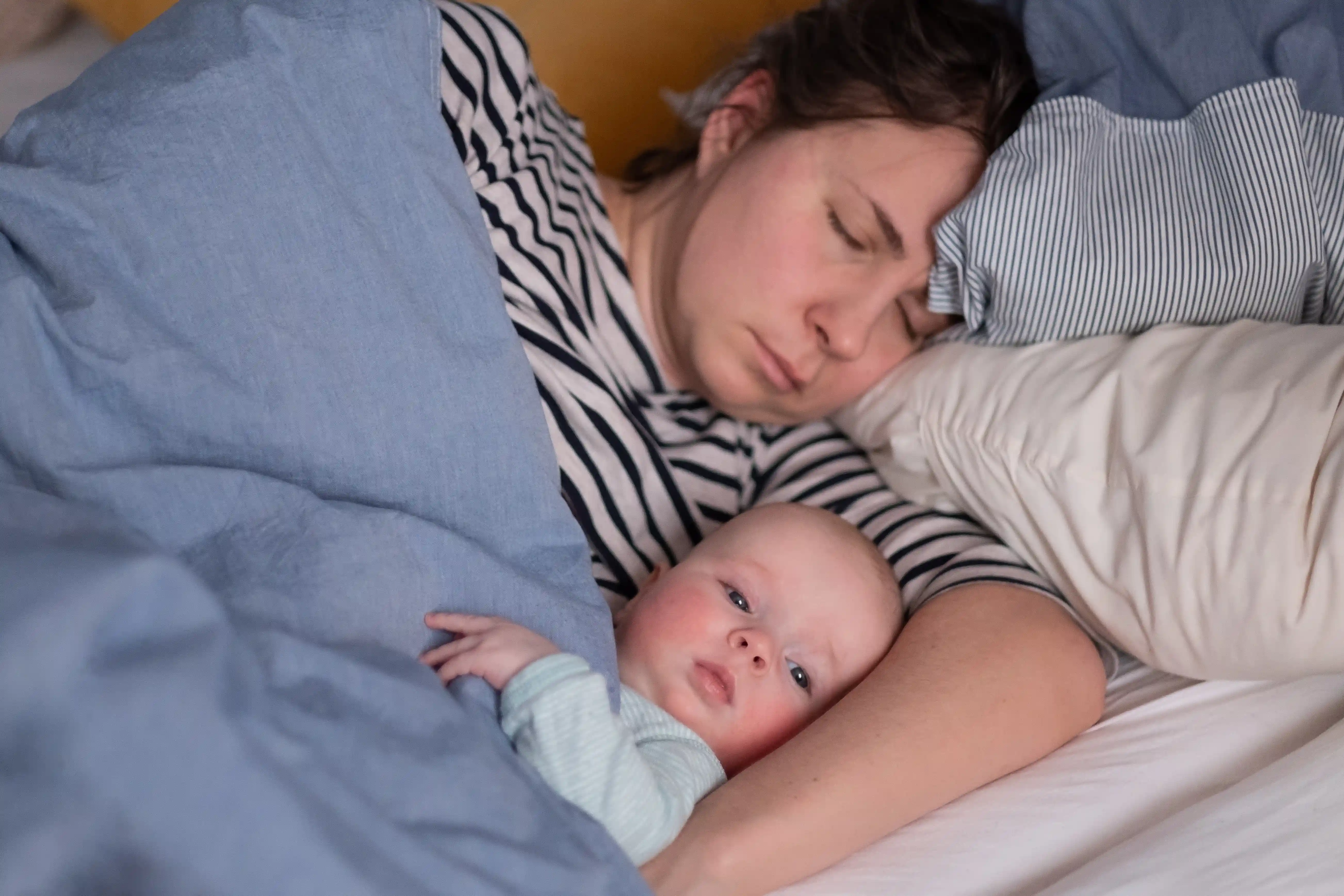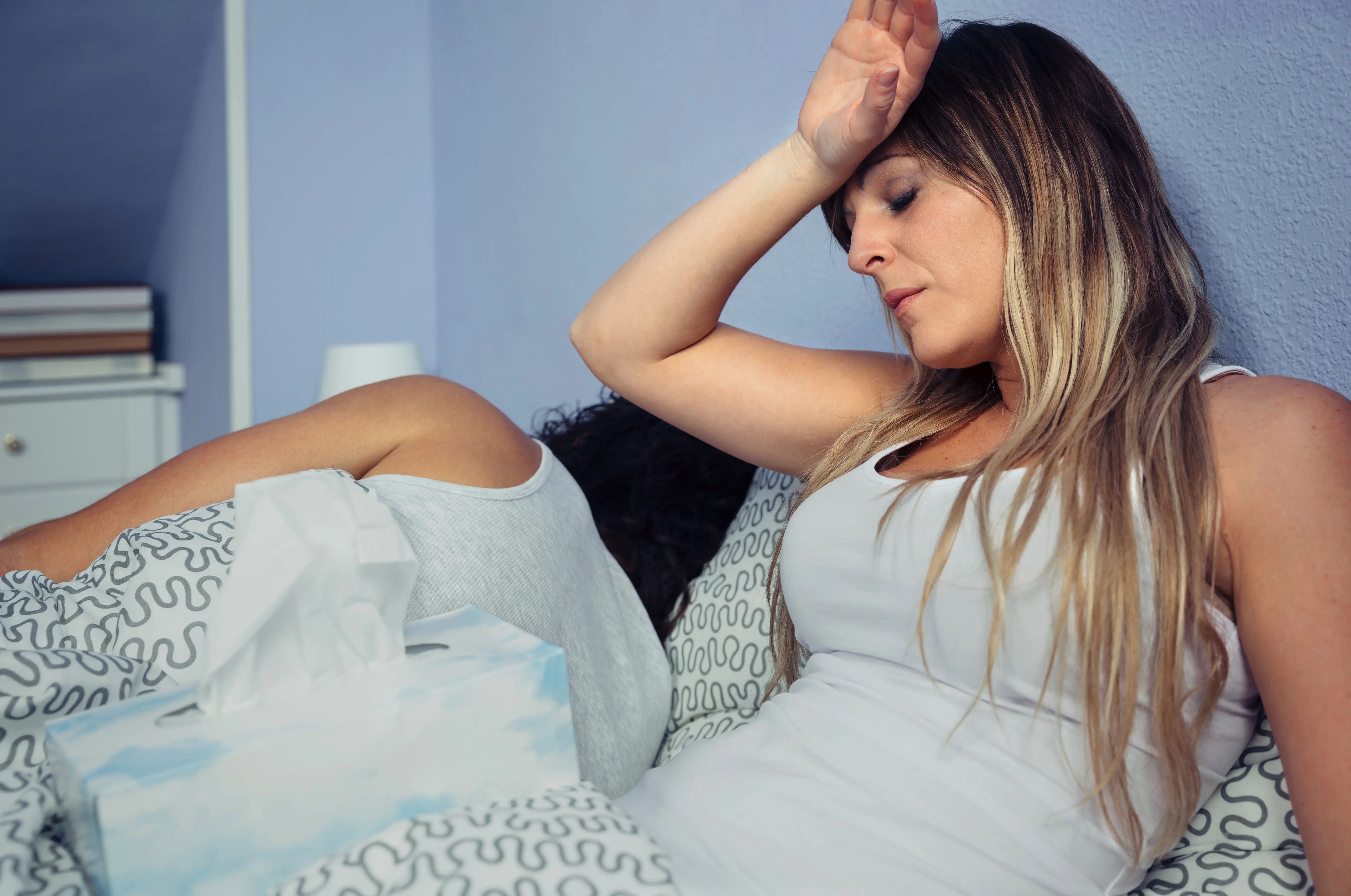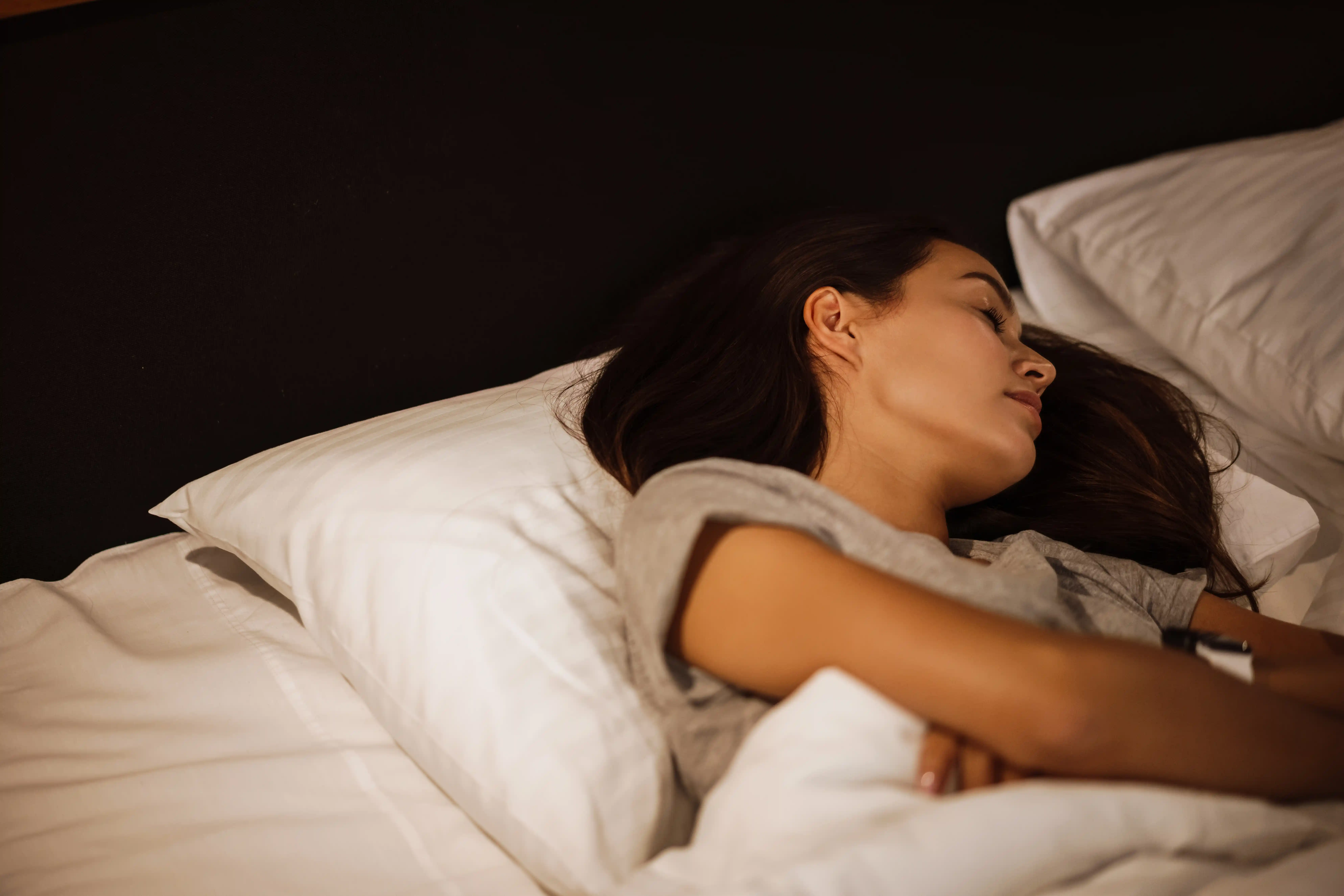After giving birth, your body goes through a whirlwind of changes as it adjusts to life after pregnancy, and for many new moms, night sweats are an unexpected part of that journey.
Waking up drenched in sweat can be uncomfortable, frustrating, and even a little alarming, especially when you're already navigating sleepless nights and hormonal shifts. But the good news is that postpartum night sweats are very common and usually temporary.
This article explains why they happen, how long they last, and how to stay cool and comfy during recovery.
What are Postpartum Night Sweats?
Postpartum night sweats are episodes of excessive sweating that happen during sleep after childbirth. They’re most commonly caused by a sudden drop in pregnancy hormones, especially estrogen, as your body works to return to its pre-pregnancy state.
Postpartum sweats often occur without any heat in the room and can leave your clothes or sheets soaked. While uncomfortable, they’re usually harmless and temporary.
When Do They Typically Start, and How Long Do They Last?
Postpartum night sweats usually begin within the first few days after delivery. They’re most noticeable during the first couple of weeks as your body sheds excess fluid and hormones start to shift.
For most women, the sweating improves within 2 to 6 weeks. However, the duration can vary depending on individual hormone levels and whether you're breastfeeding.
What Causes Night Sweats After Childbirth?
Night sweats after pregnancy often surprise new mothers, appearing just a few days after delivery. They are your body’s way of recalibrating, flushing out excess fluids, and adjusting to major hormonal shifts.
The hypothalamus regulates body temperature, and its response to fluctuating hormone levels can trigger excessive sweating, especially in the early weeks.
While they tend to be most intense during the first two weeks, some women may continue experiencing them for several more weeks, depending on factors like hormone levels, breastfeeding, and overall recovery.
Understanding the biological processes behind these sweats can make them feel a little less overwhelming, especially when you know what’s triggering them and how your body is working to heal.
Learn more about the Causes of Night Sweats.
Hormonal Fluctuations
Hot flashes after pregnancy occur due to hormonal fluctuations as the body adjusts postpartum. These temperature surges are temporary and usually subside as hormone levels stabilize.
- Drop in Estrogen: After childbirth, the body experiences a sharp drop in estrogen levels. Estrogen is key in regulating body temperature, so its sudden decline can cause a surge in body heat, resulting in night sweats. This fluctuation is your body’s response to hormonal changes as it adjusts to no longer being pregnant.
- Hormone Rebalance: The postpartum period is characterized by significant hormonal changes as your body works to return to its pre-pregnancy state. Estrogen, progesterone, and other hormones fluctuate as your body starts the process of resetting. This fluctuation can lead to excessive sweating, especially at night when your body is attempting to stabilize.
- Body in Reset Mode: After childbirth, your body goes through a reset, which includes hormonal shifts that impact various systems, including thermoregulation. As your body works to restore balance, it may trigger night sweats as part of the body's natural elimination and adjustment processes. This “reset mode” helps prepare the body for future functions like breastfeeding.
- Milk Production: Estrogen and progesterone also play an important role in lactation. The body’s preparation for breastfeeding is associated with these hormonal changes, which can intensify night sweats. The hormonal fluctuations required to stimulate milk production can disrupt the body’s normal temperature regulation, making sweating more frequent, particularly during the early days of postpartum.
- Postpartum Thyroiditis: Postpartum thyroiditis can cause hormonal imbalances that may lead to night sweats. The initial phase of hyperthyroidism, where the thyroid is overactive, can trigger night sweats after giving birth, as the body’s temperature regulation is disrupted.
Postpartum Recovery and Body Temperature Regulation
- Fluid Loss After Birth: During and after delivery, your body goes through a significant fluid loss, which is a normal part of postpartum recovery. This includes the fluid retained during pregnancy, which your body begins to eliminate. Night sweats are a natural part of postpartum healing, though they can be uncomfortable.
- Circulatory Changes: Following childbirth, the body’s circulatory system transforms. Blood volume decreases, and blood pressure levels change as the body returns to normal. These shifts can impact the body’s ability to regulate temperature properly, often resulting in heat surges and excessive sweating at night. These circulatory changes help in the recovery process but can also lead to more intense sweating.
- Metabolic Response: The body’s metabolism ramps up after childbirth, especially when recovering from the physical stress of labor and delivery. A heightened metabolism can increase body temperature, contributing to night sweats. This metabolic response also helps the body heal and adjust, but it can make it harder for new mothers to stay cool, especially during sleep.
How Night Sweats Affect New Moms

Postpartum symptoms, including night sweats, can significantly affect new mothers, both physically and emotionally. They can disrupt sleep, leaving moms feeling more fatigued, stressed, and overwhelmed.
The discomfort from night sweats, along with hormonal changes, can also lead to mood swings and frustration. Understanding and managing these sweats can help ease the emotional and physical strain, allowing moms to focus on their recovery and their newborn.
Postpartum night sweats can lead to increased body odor as the body sheds excess fluid and adjusts to hormonal changes after childbirth.
The sweating, often triggered by hormonal fluctuations, can create a moist environment that promotes the growth of bacteria on the skin, leading to stronger body odor. This is a common, temporary issue for many new mothers and typically resolves as hormone levels stabilize over time.
Disrupted Sleep and Fatigue
Postpartum night sweats can significantly disrupt a new mother’s sleep. As sweat builds up throughout the night, it often leads to waking up multiple times to change clothes or bedding, preventing uninterrupted rest.
The lack of sleep results in tiredness that can last throughout the day, making it harder to manage daily tasks and care for a newborn. This cycle of disrupted sleep and exhaustion can slow down the recovery process and leave moms feeling physically drained.
Impact on Emotional and Mental Wellbeing
Night sweats and the overall strain of adjusting to motherhood can take a toll on emotional well-being. The physical discomfort of waking up drenched in sweat can increase stress levels and contribute to a feeling of being overwhelmed.
These constant interruptions to rest can leave moms feeling frustrated, vulnerable, and less emotionally stable. As hormonal fluctuations continue to affect mood, night sweats add another layer to the emotional rollercoaster that often accompanies the postpartum period.
Connection to Postpartum Anxiety or Depression
Postpartum night sweats can also play a role in increasing the risk of postpartum depression or anxiety. The persistent sleep disruption and physical discomfort may elevate stress levels and cause mood shifts, making it harder for moms to feel emotionally balanced.
For those already experiencing symptoms of anxiety or depression, night sweats can worsen these feelings, leading to irritability or creating a more challenging emotional experience.
The feeling of isolation or embarrassment, caused by the sweat and exhaustion, can also contribute to these conditions, making it harder for new mothers to seek support.
Ways to Manage Postpartum Night Sweats

Postpartum night sweats can be uncomfortable, but with the right strategies, they can be managed effectively. From lifestyle tweaks to stress relief practices, a combination of simple adjustments and supportive habits can make a big difference. Below are some practical and calming ways to help ease this common postpartum symptom and improve your overall sleep quality.
Cooling Your Sleep Environment
- Lower the Temperature: Keeping the room cool is one of the most effective ways to reduce night sweats. Consider lowering the thermostat or using a fan to promote airflow during the night. A cool bedroom can help regulate your body temperature, reducing sweating.
- Lightweight Bedding: Using lightweight, breathable bedding can also help you stay cooler while you sleep. Go for cotton sheets or linen blankets, which allow air to circulate better than heavier fabrics, keeping you comfortable throughout the night.
- Avoid Plastic Mattress Covers: Plastic mattress covers trap heat and moisture, which can worsen night sweats. Instead, choose breathable mattress protectors made from cotton or other natural materials to keep your sleep environment cooler and more comfortable.
- Lightweight Clothing: New moms experiencing postpartum night sweats can benefit from wearing lightweight, breathable clothing to help manage body temperature. Fabrics like cotton or moisture-wicking materials can keep the skin cool and dry, reducing discomfort and helping to prevent overheating during sleep.
Staying Hydrated and Balanced
- Drink Water Throughout the Day: Staying hydrated is essential when dealing with night sweats. Drinking plenty of water throughout the day can help your body maintain fluid balance, preventing dehydration, which can worsen the effects of sweating.
- Skip Sugary Drinks: Avoid sugary drinks or sodas, as they can cause blood sugar spikes that may trigger sweating. Go for water or herbal teas instead to stay hydrated without adding to the problem.
- Add Electrolytes if Needed: If you're losing many fluids through sweat, it can be helpful to replenish your electrolytes. Drinks with a balanced mix of electrolytes can support hydration and help your body stay in balance during recovery.
- Watch Caffeine Intake: Caffeine can elevate your heart rate and body temperature, possibly making night sweats worse. Limiting your intake of caffeinated beverages, especially in the afternoon and evening, can help reduce the intensity of nighttime sweating.
Lifestyle Habits That May Help
- Avoid Spicy Foods Before Bed: Spicy foods can raise your body temperature and stimulate sweating. Try to avoid heavy, spicy meals before bedtime to prevent overheating during sleep.
- Limit Alcohol and Caffeine: Alcohol and caffeine can interfere with your body’s temperature regulation and sleep patterns. Limiting their consumption, particularly in the evening, can help minimize night sweats and improve sleep quality.
- Try Light Exercise: Engaging in light exercise during the day, such as walking or stretching, can help regulate your body’s temperature and reduce stress, making it easier for your body to cool down at night.
- Establish a Night Routine: A calming pre-sleep routine can help signal to your body that it’s time to wind down. Activities like taking a warm bath, reading, or practicing relaxation techniques can promote restful sleep and reduce the intensity of night sweats.
- Protect Your Mattress: To keep your mattress in excellent condition, consider using a breathable, washable mattress protector. This will protect your mattress from sweat and help maintain a cool and clean sleep environment.
- Try Sleep-Friendly Fabrics: Go for sleepwear made from breathable, moisture-wicking fabrics like cotton, linen, or specialized moisture-wicking materials. These fabrics allow air to circulate, helping to keep you dry and comfortable during the night.
Are Postpartum Night Sweats Normal?

Postpartum night sweats are a common response to the hormonal and physical changes that occur after childbirth. As your body works to regulate itself, shedding extra fluids and adjusting hormone levels, it’s normal to experience episodes of sweating, especially at night.
Still, it’s important to understand what falls within the range of normal and when certain symptoms might point to something else. Knowing what to expect can help you feel more in control and more confident about when it’s time to check in with your doctor.
What’s Considered Normal vs. Concerning
Night sweats during the postpartum period are usually temporary and part of the body's natural recovery. It is considered normal to experience sweats that occur intermittently for a few weeks after delivery, particularly during the first few months.
However, if the night sweats are persistent, accompanied by other concerning symptoms, or interfere significantly with daily life, it may be worth seeking advice from a healthcare provider. Any significant change, like the night sweats or their duration, should be addressed to ensure there's no underlying issue.
When to Talk to a Doctor
- Sweats Last Over 8 Weeks: If night sweats persist for more than 8 weeks without improvement, it might be time to consult a doctor. While postpartum night sweats are normal initially, prolonged symptoms could signal other health concerns or complications that require attention.
- Paired with High Fever: If your night sweats are accompanied by a high fever, it could be a sign of an infection, such as mastitis or a postpartum infection. A fever, combined with excessive sweating, warrants a doctor's visit to rule out potential health risks.
- Unexplained Weight Loss: Night sweats, when paired with unexplained weight loss, could be indicative of an underlying condition, such as thyroid issues or other metabolic concerns. If you're losing weight without trying, it’s important to seek medical advice to investigate further.
- Persistent Fatigue or Weakness: Extreme and persistent fatigue, or an overwhelming feeling of weakness, in combination with night sweats, could point to conditions like anemia, thyroid imbalances, or other health problems. It's important to check in with your healthcare provider if these symptoms continue.
Could It Be Something Else?
While night sweats are typically linked to postpartum recovery, other medical conditions could contribute to excessive sweating. For instance, thyroid imbalances, infections, or even stress can also cause sweating.
If your night sweats seem unusual or are accompanied by other symptoms, it’s worth considering whether an underlying condition could be the cause. A healthcare provider can help rule out other possibilities and offer a proper diagnosis.
FAQs
How long do postpartum night sweats last?
Postpartum night sweats usually last for a few weeks after giving birth, most commonly between 2 and 6 weeks. They are caused by the body’s effort to eliminate excess fluids and adjust to hormonal changes. For most women, the intensity gradually decreases over time.
When should I be concerned about night sweats?
Night sweats are usually harmless, but you should see a doctor if they continue beyond 6 weeks or are accompanied by fever, chills, rapid weight loss, or fatigue. These could be signs of an underlying condition like an infection or thyroid imbalance.
What are some effective ways to manage postpartum night sweats?
To stay comfortable, wear breathable, moisture-wicking fabrics and use light bedding. Keep your room cool with a fan or air conditioning, and stay well-hydrated throughout the day. Avoid triggers like spicy food, alcohol, and caffeine before bed.
Do postpartum night sweats affect breastfeeding?
Night sweats themselves don’t interfere with breastfeeding. However, because you’re losing fluids through sweat, staying hydrated is vital for maintaining a healthy milk supply. If you feel dehydrated or fatigued, increase your water intake and rest when you can.
Conclusion
Postpartum night sweats are a normal part of recovery and typically subside as your body adjusts. While they can be uncomfortable, you can manage them with simple strategies like cooling your sleep environment and staying hydrated. If the sweats persist or become concerning, it's important to consult a healthcare provider to rule out any underlying issues.
Karen Barnard
Karen is a Human Movement Science expert and a certified sports nutrition and massage therapist. At Sleepiverse, she combines her passion for human movement science and sleep health to educate herself and her readers about healthier sleep. In addition to writing articles, Karen manages a fitness studio offering private training, athletic conditioning, and sports massage therapy. She focuses on providing people with a holistic environment for people to reach their health goals, often incorporating stretch therapy to promote mental tranquillity and help people improve their sleep.


